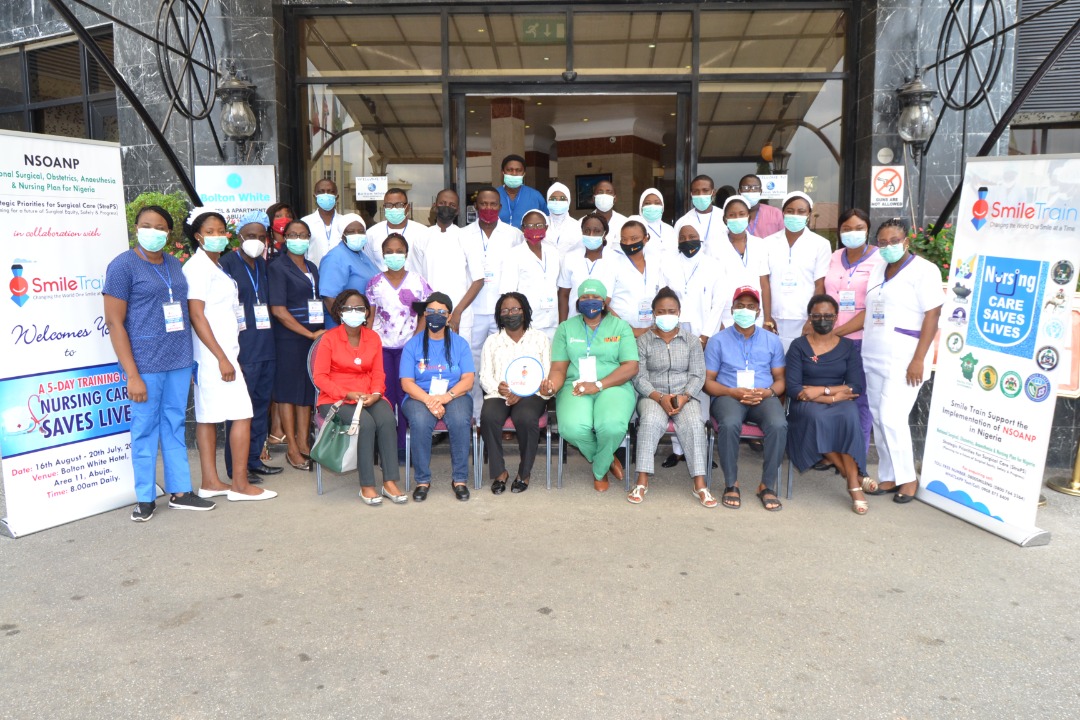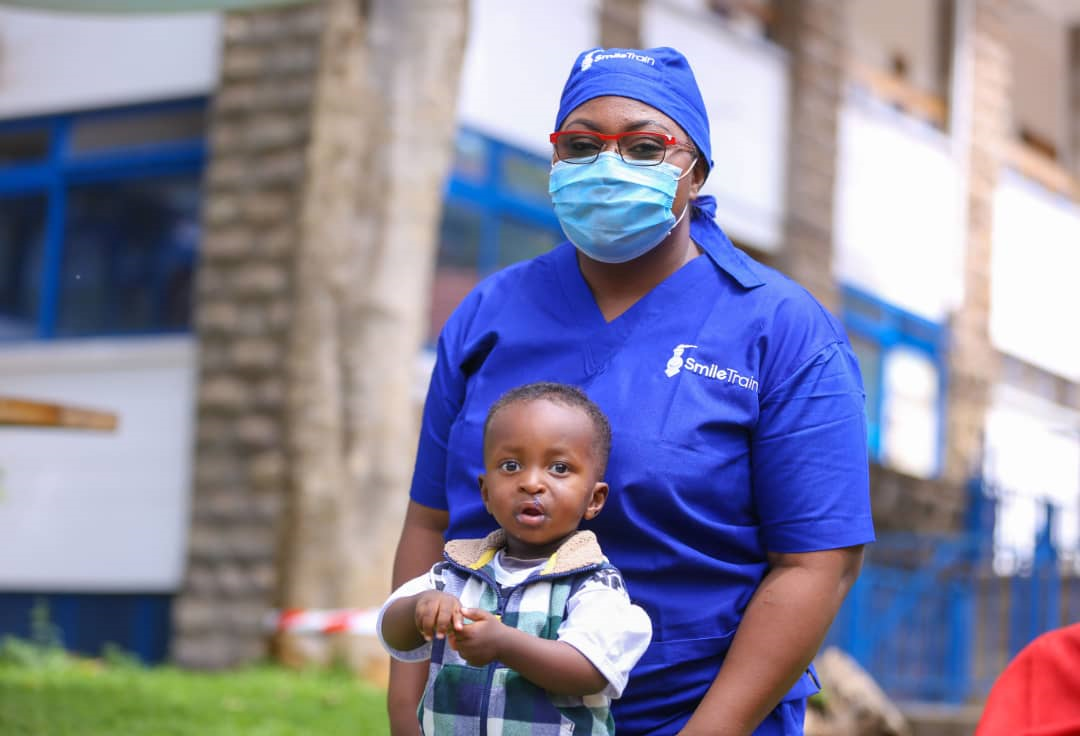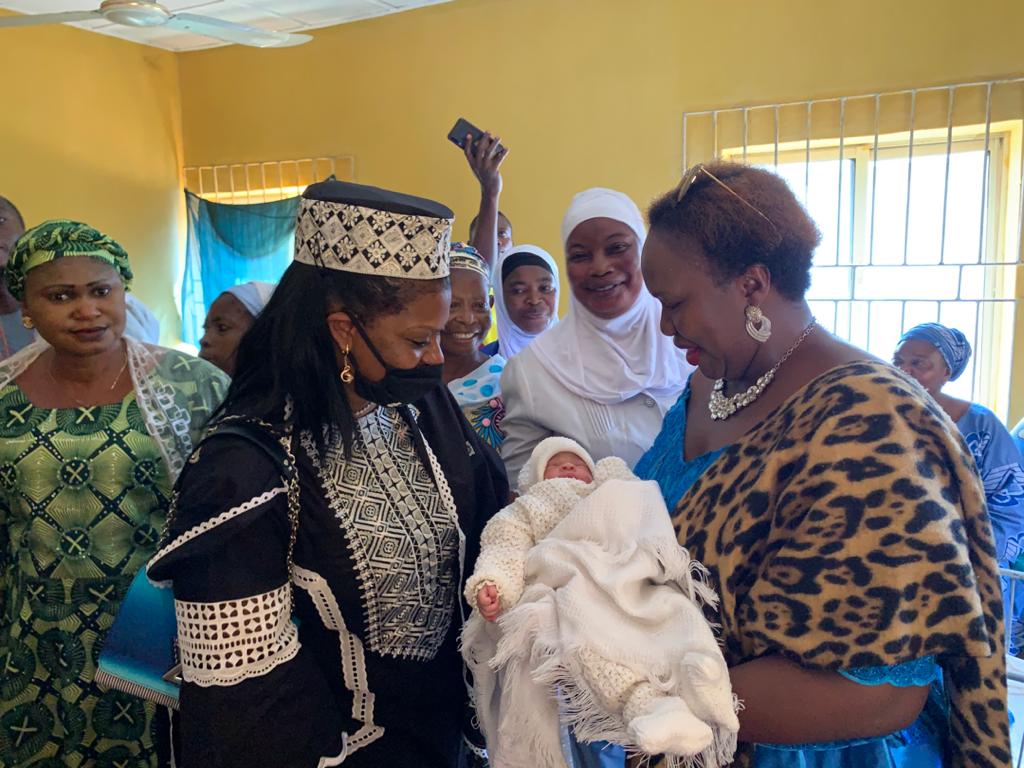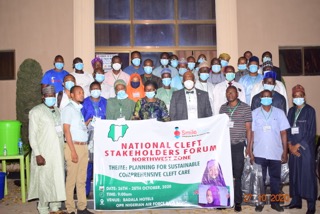Health
Practice makes perfect — training the next generation of Nigeria’s health workers

Dr. Adeola Adekunle is a senior resident doctor and trainee surgeon in Lagos. His success is a product of constant learning — even in the midst of a pandemic.
Intermittent beeps from the anesthesia machine permeate the operating room. A ceiling-mounted surgical light beams over the face of Mirabel Nwokorie, a 23-month-old baby, about to undergo a cleft palate repair.
After the anesthetists have put the baby to sleep, Dr. Adeola Adekunle, a senior resident doctor and an oral and maxillofacial surgeon at the Lagos University Teaching Hospital, fits a metal device inside her mouth to keep it open.
A nurse nearby hands him scalpels and scissors on request. Adekunle looks relaxed, focused and unfazed by the task before him.

He occasionally chats to his trainers and colleagues Dr. Olugbemiga Ogunlewe and Dr. Olutayo James, during the procedure. Sporadic chuckles and banter among the team add a spark of liveliness to the room
The surgery lasts for over two hours. As she wakes up, Mirabel starts to whimper.
Beads of sweat line Adekunle’s forehead as he removes his scrub and gloves. He settles into a plastic chair and fills out a form.
Adekunle says he loves the rapid transformation and relief cleft lip and palate repair surgeries bring to both patients and their families.
“The biggest motivation for me … is the joy we put on the faces of the parents of these children,” he says.
A father of two, the 35-year-old surgeon didn’t see himself becoming a doctor when he was in junior secondary school.
“I hated being in hospitals,” he remembers with a smile.
Then a close friend had a bone fracture and got admitted to hospital. Adekunle began to visit frequently and the idea of becoming a doctor slowly took hold of him.
He went on to graduate with a degree in dental surgery and a distinction in restorative dentistry at Obafemi Awolowo University in 2010.
But Adekunle’s education doesn’t end there. He continues to undertake more training programs to become adept at cleft care. Smile Train is partnering with the West African College of Surgeons to provide an annual nine-month fellowship training program on cleft care to surgeons across West and Central Africa. The postgraduate training, which commenced in training sites in Nigeria, Ghana and Senegal in early July, will groom six surgeons annually over the next five years and help them to specialize in cleft care.
Dr. Adeola Adekunle, a senior resident doctor at LUTH since 2014, explains how training has enabled him to grow his skills and become adept at cleft care.
Since April, he has been taking lessons on comprehensive cleft care on Zoom. Instructors use a mix of text and photos for illustration.
Adekunle says the online training has brought trainees and experts from several West African countries together to share ideas, learn from different specialists and to exchange knowledge and experience.
Usually trainees have to travel to training centers to receive instructions and learn from more experienced surgeons in the theater. In late March, federal authorities imposed lockdowns to reduce the spread of the coronavirus pandemic, affecting mobility and forcing the dental clinic at LUTH to stop operations.
Since April, Smile Train and the West African College of Surgeons have been running a virtual training program in order to overcome mobility restrictions brought in due to the COVID-19 pandemic. The sessions, which take place over Zoom, bring together trainees and experts from across West Africa to share ideas and knowledge.
Nigeria reported its first confirmed case of COVID-19 in late February.

Health authorities scrambled to increase training and equipment as cases spread across the country’s 36 states.
The pandemic exposed the challenges battering Nigeria’s underfunded healthcare system. In 2017, Nigeria’s health expenditure as a share of GDP was 3.76%, compared to South Africa’s 8.11%. Since 2016, Nigeria’s budgetary allocation to the healthcare sector as a share of annual federal budget has been below 5%, significantly lower than the 15% African nations agreed to allocate to their health budgets during the Abuja Declaration meeting in 2001. Out-of-pocket expenditure still accounts for over 70% and the National Health Insurance Scheme, launched in 2005, has only achieved some 5% coverage.
Several decades of neglect has created huge gaps in health infrastructure, medical supplies and personnel. It also fueled medical tourism, with Nigerians spending at least $1 billion per year on medical bills overseas. The density of medical professionals to the population is also abysmal. Nigeria has only 3.8 medical doctors per 10,000 people, 5.6 nurses per 10,000 population and 0.22 dentists per 10,000 people.
Poor remuneration and infrastructure, and lack of medical supplies has led to brain drain in the health sector. Nigerian-trained health workers constitute the third largest group of foreign-trained doctors working in the U.K. Over half of the estimated 72,000 doctoMuyiwa Rotimi, consultant anesthetist and a member of LUTH’s COVID-19 response team, urges the government to prioritize funding and regular training for healthcare workers.
“If we don’t start now, we might find ourselves in the same place after five years,” Rotimi warns.
Until LUTH began a partnership with Smile Train in 2007, cleft care was largely limited to surgical repairs. But to provide comprehensive cleft care, a team consisting of surgeons, anesthetists, speech therapists, nurses, ENT or ear, nose, throat surgeons, orthodontists, nutritionists, and social workers are allrs registered with the Medical and Dental Council of Nigeria work outside of the country and a Several decades of neglect has created huge gaps in health infrastructure, medical supplies and personnel. It also fueled medical tourism, with Nigerians spending at least $1 billion per year on medical bills overseas. The density of medical professionals to the population is also abysmal. Nigeria has only 3.8 medical doctors per 10,000 people, 5.6 nurses per 10,000 population and 0.22 dentists per 10,000 people.
Poor remuneration and infrastructure, and lack of medical supplies has led to brain drain in the health sector. Nigerian-trained health workers constitute the third largest group of foreign-trained doctors working in the U.K. Over half of the estimated 72,000 doctors registered with the Medical and Dental Council of Nigeria work outside of the country and a new ‘Health and Care Visa’ policy launched on July 15, 2020 by the U.K. government and open to Nigerians, may encourage others to follow.
Current health expenditure (% of GDP) 2000-2017
Source: World Bank
Muyiwa Rotimi, consultant anesthetist and a member of LUTH’s COVID-19 response team, urges the government to prioritize funding and regular training for healthcare workers.
“If we don’t start now, we might find ourselves in the same place after five years,” Rotimi warns.
Until LUTH began a partnership with Smile Train in 2007, cleft care was largely limited to surgical repairs. But to provide comprehensive cleft care, a team consisting of surgeons, anesthetists, speech therapists, nurses, ENT or ear, nose, throat surgeons, orthodontists, nutritionists, and social workers are all needed. These specialists needed to be trained in cleft care, and cleft surgeons trained to work with them.
Professor Ronke Desalu, consultant paediatric anaesthetist at LUTH, explains how the pandemic affected the delivery of services and health worker well-being at the hospital.
Additionally, the cost of care, stigma, and lack of awareness meant LUTH treated fewer than ten cleft patients annually, says Professor Olugbemiga Ogunlewe, chief cleft surgeon and head of LUTH cleft care team. According to Dr. Adekunle and Dr. James, a cleft lip and palate surgery costs between 150,000 to 200,000 naira (USD395 to USD526), a fee that most Nigerians from lower socioeconomic backgrounds cannot afford.
Since it began its partnership with LUTH, Smile Train has improved access to training and medical equipment while funding cleft lip and palate surgeries. A survey in 2017 found that 84% of cleft surgeons interviewed were working in university teaching hospitals. Cleft surgeons in LUTH now perform at least Mirabel is just one of the patients currently experiencing the benefits of this partnership and commitment to training of health professionals.
Outside the operating theatre complex, Ijeoma Nwokorie, Mirabel’s mother, waits with trepidation.
Around 1 p.m. she reunites with Mirabel, her eyes full with emotion.
Adekunle reassures her that her baby is in perfect condition and instructs Nwokorie to prevent the baby from touching her mouth.
“She will be fine,” he declares, his tone upbeat.
At the hospital ward, Nwokorie looks over Mirabel as she sleeps in her arms.
Nwokorie remembers how startled she was after noticing a hole on the roof of Mirabel’s mouth some weeks after her birth. Food and liquid leaked out of her baby’s nose, too. Doctors at a private hospital told her nothing was amiss. Herhusband, too, said that was how “her own God created her”.
A year later, when she birthed another baby who didn’t have a cleft palate, her fears heightened.
A friend told her the surgery can only be performed in the U.S. Confused and anxious, Nwokorie turned to the internet.
“What causes a baby to have a hole in her mouth,” she remembers searching on Google and breaks into laughter.
“Can cleft palate surgery be done here in Nigeria,” she recalls typing again. That was how she found LUTH, visited in January and then learnt that Smile Train covers the cost of caring for the baby, including the palate repair.
“I could not believe … that Nigerian doctors did this miracle,” Nwokorie says after the surgery.
Ensuring patients and their families can receive care close to home has been one of the training program’s main goals.
“We want to train people who can stand on their own and go and help these babies wherever they are established,” he says, citing the example of a Béninoise surgeon who was sponsored by Smile Train to receive cleft training at LUTH last year through the WACS fellowship program. After the cleft training, the trainers helped the surgeon to set up a clinic in N’Dali city in northern Benin Republic.
“When you train people you get more services to people in remote areas,” he says, adding that the Béninoise surgeon sends pictures via WhatsApp whenever he has any complicated cases and they guide him through it.
Four hours after the surgical repair, Adekunle visits the pediatric ward to check Mirabel.
He chats with the mother about the baby’s condition and encourages her to stay positive. He goes over his previous instructions about feeding for emphasis.
“By Tuesday she will be discharged,” he tells her.

Just before nightfall, Adekunle ambles to his car parked by the entrance of the towering dental clinic. “When it gets done it is a big relief,” he says of the cleft surgery. “You just know that this is another [case] that has been sorted [out] so we move to the next one.”
He looks tired and doesn’t walk with his usual brisk gait. He makes small talk with a colleague who is turning on his ignition. They both smile and make farewell gestures before
his colleague drives off.
Quizzed on his future plans after his senior residency training, Adekunle prevaricates.
“I don’t know yet; I really cannot say,” he remarks, reflecting for a moment.
Would he stay at LUTH if the conditions are right?
“Yes I will,” he says.
Health
KWSG flags off measle-rubella, polio vaccination campaign
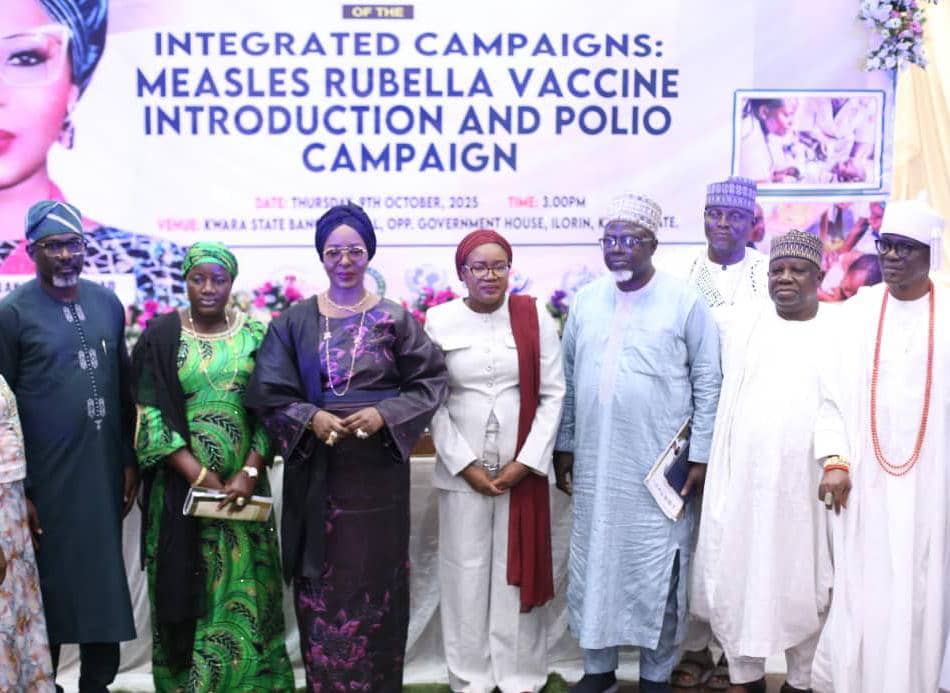
- First Lady says it’s life-saving initiative, urges active participation
Stephen Olufemi Oni, Ilorin
Kwara State Government has launched an integrated vaccination campaign to prevent Measles Rubella and Polio diseases among vulnerable groups in the state.
The exercise, which will last for 10 days – beginning from Saturday 11th October 2025 — is expected to cover at least 1.8 million children whose ages range between 9 months and 14 years (for Measles Rubella vaccine) and zero to 5 years for oral polio vaccine.
The programme was organised by the Kwara State Primary Healthcare Development Agency in collaboration with UNICEF and World Health Organisation (WHO), among other development partners.
At the flag off ceremony in Ilorin, the state capital, Kwara’s First Lady, Ambassador Prof. Olufolake AbdulRazaq, said the initiative is not just a policy milestone but a life-saving intervention for Kwara children and families.
She called on all parents and guardians to present their children within the age range for the vaccination.
“I commend the Kwara State Primary Healthcare Development Agency and all development partners for the efforts that culminated in the launch of the roll out of Measles Rubella Vaccine in the state,” First Lady Ambassador Olufolake AbdulRazaq said.
She said the introduction of the measles-rubella (MRV) vaccine is essential and timely, considering the outbreaks of measles in some parts of the country.
According to her, Nigeria now contends with a reality in which only about 60 percent of children receive the first dose of measles vaccine, while the second dose coverage is as low as 38 percent, noting that this coverage gap is responsible for the outbreaks.
By launching MRV, the country, Kwara inclusive, stands the chance of closing a long-standing gap towards protecting every child, mother, and family, she added.
The First Lady enjoined relevant stakeholders, including traditional and religious leaders, community heads, and the media, to complement government’s efforts in propagating the benefits of measles rubella and polio vaccines.
Commissioner for Health, Dr Amina Ahmed El-Imam, said the campaign is a transformative public health initiative to save lives across the communities.
El-Imam, who was represented by the Permanent Secretary, Ministry of Health, Dr Abdullahi Taoheed, urged all stakeholders to commit resources and attention to raising awareness, mobilising communities, and overcoming any logistical or cultural barriers to vaccination.
Executive Secretary, State Primary Healthcare Development Agency, Prof Nusirat Elelu, said the agency is deploying 8,657 trained personnel, including health workers, supervisors, and security personnel to carry out the campaign.
“Measles remains one of the most contagious and fatal viral diseases affecting young children globally, despite the availability of a safe and highly effective vaccine,” she said.
“Between years 2000 and 2023, it is estimated that measles vaccination alone averted over 60 million deaths globally. Yet, the disease remains endemic in many developing countries, particularly Africa and Asia.”
Prof Elelu said Rubella poses a serious risk to pregnant women, such as miscarriage, fetal death, or the birth of infants with Congenital Rubella Syndrome (CRS).
Assuring that the agency will not rest on its oars to safeguard the people’s health, Elelu said immunization, ante-natal and all non-complicated delivery are given free of charge across primary healthcare centres (PHCs) in the state.
The Executive Secretary commended Governor AbdulRazaq for his huge investments in the health sector, and his Deputy, Mr Kayode Alabi, who is the
Chairman of the State Task Force on Immunization and PHC, for the untiring support.
“We are extremely grateful to Her Excellency, Amb. (Prof.) Olufolake AbdulRazaq, whose relentless advocacy for maternal and child health has been a beacon of hope for our communities,” she added.
Dr. Adeola-Musa of the National Primary Healthcare Development Agency enjoined community leaders and parents to embrace the exercise by mobilising children for vaccination.
Surveillance Officer for World Health Organization (WHO), Mrs Abdulkadir Rashidat, said the vaccines are safe, effective and suitable to protect the children, calling on all parents and community leaders to accord the vaccination teams the needed support to function.
Ibrahim Tsado Mohammed, a Social and Behaviour Change Specialist at
UNICEF, warned that measles, rubella, and polio continue to pose significant health threats to children despite global progress.
He implored the media and civil society organisations to help counter misinformation in some quarters and reduce hesitancy surrounding the vaccination campaign.
Some of the dignitaries at the event were the Deputy Chief Whip, Kwara House of Assembly, Hon. Mariam Yusuf Aladi; Chairman House Committee on Health, Hon. Seun Oguniyi; Cabinet members; Acting Head of Service, Kwara State, Mrs Shittu Olufunke Mercy; Chairman, State Civil Service Commission, Hajia Habibat Yusuf; Permanent Secretaries; Emir of Shonga, Dr Haliru Yahaya; Olupako of Share, Oba Olawale Haruna Ilufemiloye; and Balogun Alanamu of Ilorin, Dr Usman Abubakar Jos, represented by Alhaji Bolaji Ibrahim Alanamu.
Others were wife of the State Chief Judge, Mrs Olufunke Adebara; spouses of Chairmen of the 16 Local Governments; and wife of the State APC Chairman, Princess Ayodele Fagbemi.
End
Health
World Sight Day 2025: FG Urge to Prioritize Eye Health as 1.3m Nigerians estimated to be blind

From our Correspondent
The Chairman, National Eye Health Committee, Prof Afekhide Ernest Omoti has stressed the need for individuals, communities, and governments to prioritize vision care as a vital part of overall health and national development.
The medical expert disclosed that findings revealed that 1.3 million Nigerians are estimated to be blind with over 80% of these cases being preventable or treatable.
Prof. Omoti who is a consultant ophthalmologist and also the Chairman, Eye Health Committee of the Nigerian Medical Association (NMA), made the call as part of activities to commemorate the 2025 World Sight Day with theme, “Love Your Eyes”, “Love Your Eyes at work”, “Love Your Eyes Kids”, “Love Your Eyes – Protect the Future,”.
Prof. Omoti stated that the World Sight Day 2025 is a global event dedicated to raising awareness about the importance of eye health and the prevention of avoidable blindness.
Prof. Omoti also noted that in Nigeria, millions of Nigerians suffer from visual impairment, and many are at risk due to preventable causes.
“As we celebrate today, let us remember that vision is not just about sight; it is also about connection, opportunity, and the ability to navigate the world. Our eyes allow us to experience the beauty of life and our environment, from the smiles of our loved ones to the vibrant culture that surrounds us.
“This year’s theme, “Love Your Eyes”, “Love Your Eyes at work”, “Love Your Eyes Kids”, “Love Your Eyes – Protect the Future,” calls each of us – individuals, communities, and governments to action. This is because when we protect our eyes, we are not just safeguarding sight; we are securing productivity, learning, inclusion, dignity, and the future of our nation.
He emphasizes the urgent need for individuals, communities, and governments to prioritize vision care as a vital part of overall health and national development.”he said.
Speaking on the significance of the day, Prof Afekhide Ernest Omoti, a consultant Ophthalmologist, past chairman of Edo NMA and Chairman of the Eye Health Committee called on the public to take proactive steps toward protecting their vision.
He noted that eye health is not a privilege or a luxury but a human right, which, according to him, is also a cornerstone of national development.
“When we invest in eye care, we reduce poverty, boost education, and empower individuals to live full, productive lives. Little wonder that many of the sustainable development goals depend on good vision.
According to him, every Nigerian deserves access to affordable and quality eye care.
Prof. Omoti, while urging all Nigerian citizens to get their eyes tested regularly and to seek care early, especially for children and the elderly said over 1 billion people worldwide live with vision loss that could have been prevented or treated.
“Estimates in 2020 suggest that 24 million people in Nigeria were living with some form of vision loss, many unnecessarily. An estimated 4.25 million adults aged 40 and above have moderate to severe visual impairment, 1.3 million Nigerians are estimated to be blind with over 80% of these cases being preventable or treatable.
“Cataracts, glaucoma, refractive errors, tropical diseases, and diabetic retinopathy continue to rob our people both young and old of their sight, their confidence, and their economic potential. We can not afford to ignore this any longer.” Omoti said.
Health
Milestone; Kwara LG Declared Open Defecation Free by FG

Stephen Olufemi Oni, Ilorin
The Federal Ministry of Water Resources and Sanitation has officially declared Oke-Ero Local Government Area (LGA) in Kwara State as Open Defecation Free (ODF), following a comprehensive validation exercise conducted by the National Task Group on Sanitation (NTGS).
The validation exercise was carried out between 21st and 25th July, 2025 by the NTGS, during which Oke-Ero LGA was assessed in accordance with the revised national ODF protocol. Based on the findings, the LGA was found to have met all required indicators and was therefore approved for ODF status on 27th August, 2025.
The official communication of this development was conveyed to Mr. Olorunfemi Adewumi Oladipo, the General Manager of the Kwara State Rural Water Supply and Sanitation Agency (RUWASSA), through a formal letter authored by the Director of Water Quality Control and Sanitation at the Federal Ministry; Mrs. Elizabeth Ugoh. The letter was issued on behalf of the Minister of Water Resources and Sanitation.
Mrs Elisabeth Ugoh, who congratulated the Kwara State Government and the people of Oke-Ero on achieving this national milestone, noted that sanitation is a continuous activity.
The correspondence described the achievement as a significant step forward in the national effort to eradicate open defecation and commended the sustained efforts of the local government, community leaders, stakeholders, and sanitation partners.
It would be recalled that the NTGS validation team conducted detailed assessments across households, institutions, and public spaces in Oke-Ero LGA, confirming the absence of open defecation and the presence of functional sanitation facilities, hygiene awareness, and sustained behavioural change, all of which are prerequisites under the national ODF criteria.
As part of the formal process, the Minister, Prof. Engr. Joseph Terlumun Utsev, is expected to communicate this achievement in writing to Governor AbdulRahman AbdulRazaqn, as, in line with established national protocol, the Governor is expected to host an official event to commemorate the ODF declaration of Oke-Ero LGA.
Reacting to the development, the Commissioner for Water Resources, Hon. Yinusa Lade, lauded the milestone as a testament to the state’s unwavering commitment to improving sanitation and public health. He commended the people of Oke-Ero for their resilience, cooperation, and ownership of the sanitation initiatives, which he described as critical to the sustainability of this achievement.
Hon. Lade, who reiterated the State government’s commitment to scaling up similar interventions across other LGAs, noted that with Oke-Ero setting the pace, the Ministry will intensify efforts to ensure that the entire State is declared Open Defecation Free well ahead of the national 2030 target.
Responding to the announcement, Mr. Oladipo expressed appreciation for the recognition, describing it as a reflection of collaborative effort across multiple levels of governance and community participation. Mr Olorunfemi Oladipo reaffirmed RUWASSA’s continued commitment to supporting other LGAs in the State to achieve similar results.
Mr Oladipo also urged local authorities and stakeholders in Oke-Ero to ensure the sustainability of this status, by adhering to the recommendations outlined in the validation report, which has been enclosed with the official communication.
This development positions Kwara State as one of the leaders in sanitation progress and contributes meaningfully to Nigeria’s broader objective of eliminating open defecation nationwide by 2030, in alignment with the Sustainable Development Goals (SDGs).
End
-

 Uncategorized5 years ago
Uncategorized5 years agoFG, states urged to harness flooding for ranching, others with technology – Agbaje
-

 Headlines10 years ago
Headlines10 years agoBreaking: EFCC seals Borno House of Assembly, as Hon members take to their heels
-

 News12 years ago
News12 years agoNigeria Security Operatives Stage Manhunt For Homosexual Perpetrator
-

 News9 years ago
News9 years agoHow 21-year-old Girl fled community over accusation of lesbianism
-

 News10 years ago
News10 years agoYobe Gov Moves Against Deputy
-

 Opinion7 years ago
Opinion7 years ago7 signs she has friend zoned you
-
Technology4 years ago
Online job placement company headhunts women
-

 Headlines10 years ago
Headlines10 years agoBorno Dep Gov Abducts Another Church Leader

